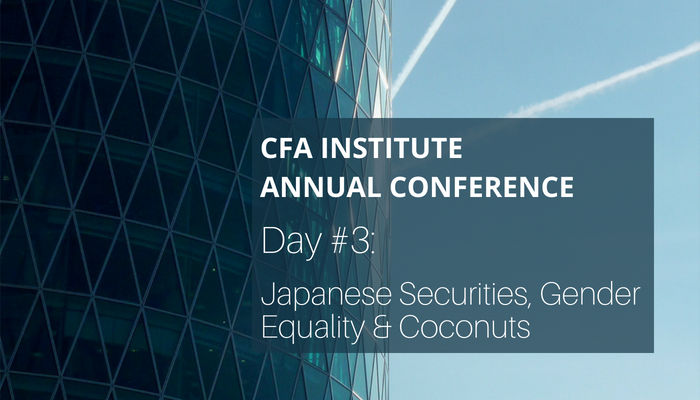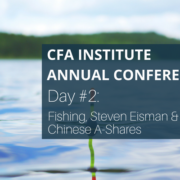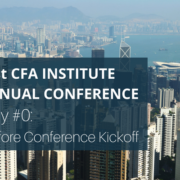CFA: Day #3 – The Girl with the Graphs and the Chinese Coconut
Until now, day three has been the best, and for surprising reasons. There was a FinTech session, but it was quite disappointing, even though I have a great interest in FinTech. A presentation on Japan, an unwillingly comic corporate presentation from Hong Kong Exchanges and Clearing(HKEX) and a really brilliant presentation on ‘Illusion of control’ saved the day
By Kenneth Brandborg, Partner | The 16th of May 2018
30 years of knowledge in too little time
I didn’t think that I cared about Japan’s economy or their prospects for that matter. Japan was something you invested in decades ago and has ever since disappointed – or so I thought. When you get the story presented by the Chief Japan Strategist from Goldman Sachs, it can be interesting. And it was. Even though Kathy M. Matsui tried to ruin the presentation with the first rule of don’ts in presentations. She had way too many slides. Apparently, she knew that, and trying to fix it she broke rule number two. Too much information on each slide. Instead of having one graph per slide, she had two. The 45 minute presentation had no less than 45 graphs and 2 tables. But still she couldn’t ruin the very interesting story on Japan. Notably, was that the western concern about robots coming and stealing our work and taking over jobs, is a dream scenario in Japan. In some sectors, there are twice as many jobs as there are applicants. With an unemployment rate of 2.5% and an aging population, robots aren’t an option – it is a prerequisite for continuing growth and prosperity.
Kathy gave some very strong pros for buying Japanese securities; Nikkei index has doubled driven by increasing EPS, new legislation on independent boards has been made, and domestic demand is rising. So why aren’t we buying? Well there may be hundreds of reasons. One might be that we, in Europe, have adopted the zero interest-rate environment, and that has and still is giving us some very serious concerns. Maybe we are afraid to buy into an even longer running zero interest economy? There must be something fishy about the positive outlook. And now to the Japan fun facts;
- Until recently Japanese people did not have a tax ID. Who would have guessed that this would be the case in one of the most organized countries? And 70% of all companies do not even pay tax.
- New legislation has been passed forbidding more than 720 hours of overtime per year. I do think, that in general, that law would have very little relevance in Denmark.
Women on Stage
This year’s conference has a very high gender equality when it comes to presenters. I haven’t done the calculation, but there is approximately a 50-50 split. Still it does violate my gentleman genes, that I have to point at a woman for an unwillingly comic presentation. Here is why.
Yesterday Jason Hsu gave a brilliant presentation on the issues regarding Chinese A-shares. Today Victoria Coe did a presentation on how HKEX is facilitating the trading with Chinese A-shares. There was nothing wrong with her presentation, but the entire message was comic. HKEX is basically offering a brand-new highway for investors to start trading in Chinese A-shares. But if you take Jason’s presentation into account, you will have to drive on this new highway in a vehicle that isn’t really working well. And to put a cherry on top. The Chinese A-shares are entering the MSCI index, so if you are a passive investor, you must drive there. This does pose a slightly more important discussion about active vs. passive management. If you are passive you must buy the Chinese A-shares according to the index. No matter the clear asymmetric information and non-rational price setting. Normally I take a neutral stance on active versus passive, but in the Chinese A-share case I would go with active any day. That only poses one really challenging task: Pick the right manager in a very immature market.
Of course, there needs to be built an infrastructure, and eventually the Chinese A-shares market will normalize with the large expected inflow of institutional money, but giving a presentation that totally neglects the current issues didn’t make HKEX stand out as particularly trustworthy. So, there is just one thing to say to HKEX: ‘Let’s measure up’.
The Chinese Coconut
The last show of the day was indeed a show. After five minutes Anil Gaba had condemned an undefined group of investment professionals to hell. You could say they had it coming, since they incurred big losses on the Church of England’s pension fund. Not once, but twice. That is the completely wrong client to mistreat on an eternal perspective.
For years, academies have used animals to explain to us the concept of (uncontrollable or badly controlled) risks. Most famous is perhaps Black Swans as defined by Nassin Taleb. An analogy so misused to explain any bad behavior, bad ethics and large fiduciary losses. A black swan is the dot-com bubble predicted in the ‘80s. You couldn’t have done it, because the underlying technology wasn’t invented. So, Anil gave the known unknown risks a new name. And in the respect of nature it has now become a vegetarian. Risks are now coconuts. The type of coconuts that drops from the tree on your head and kills you. You know that in theory it can happen, but it is almost impossible to model. The issue is to acknowledge these kinds of risks not to take shelter in more and more complex models that predict only known knowns. This is in fact not a new subject. Last year I heard almost the same presentation. At that time, it was just a grey rhino (held by Michele Wucker), and the presentation back then, wasn’t half as entertaining as this year’s. So, I’ll go with the coconut. Just to make the company presentation more comic, Anil used Chinese A-share again and again as an example of coconut risk.
You can read about Kenneth Brandborg’s second day at the conference here
Kenneth Brandborg, Partner
Kenneth, CFA charter holder, has worked in the financial sector since 2001 with focus on implementation and development of risk management, performance calculation and investment management systems within insurance, pension, banks, Capital Markets, as well as asset management.
Kenneth has broad business and system knowledge within Front, Middle and Back Office, with focus on risk- and performance measurement. Furthermore, Kenneth has several years of teaching experience on GDBA, BA, master and CFA courses.
Read more about Kenneth and our other CMP consultants here







